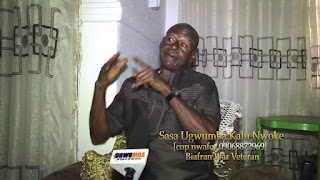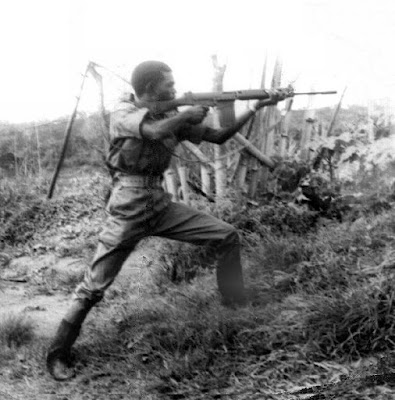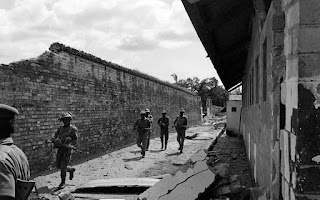BIAFRA: Corporal Nwafor And Weeping Souls
Sasa Ugwumba Kalu Nwoke. Image via Youtube
There is an uncanny twist to the civil war which seems to blind those of us who should let the world know what really happened. I am talking about people from the former eastern region who were forced by genocide to become Biafrans in 1967.
Sasa Ugwumba Kalu Nwoke was a class three student of the elite Government Secondary School, Afikpo, when the genocide began in 1966. Born into a comfortable middle-class home, his ambition was not to fight in any kind of war even if his Ohafia ancestors were warriors.
A chance trip to the Enugu train station where he saw headless bodies and human parts brought in from Northern Nigeria turned him to a man.
At school, he could neither bear the sorry sight nor console his junior, Nicholas Obasi. The boy’s father hid in a sack and watched as his pregnant wife was slaughtered in their Kano home. The foetus was not spared.
At 16 years on January 28, 1968, Sasa forced his way into the Biafra Army after several failed attempts at enlistment. He was given the number BA 61832. The boy soldier was posted to an Armoured battalion.
On June 30, 1968, another young soldier, Corporal Nwafor, from Umuoji, dug in with other combatants of B company, 29 battalions, 54 brigades of the 11 division along the Enugu-Onitsha Road. They faced troops of Nigeria’s First Division.
At Ugwu Nwasike, Ogidi, a Nigerian column was almost sure of a smooth march to Osha when Corporal Nwafor, a gunner, fired the only available 73 mm bazooka at an advancing saladine armoured car.
It was a direct hit that confused the federal forces. In the ensuing fight to capture the war machine, the corporal lost his life. The Biafrans retrieved the saladine, worked on and renamed it ‘Corporal Nwafor.’
Sasa had become a trained gunner and was assigned to ‘Corporal Nwafor.’ The driver was another teenager, Daniel Lawrence, from Ikom whose mother hailed from Liverpool, England. He was better known as ‘Pampas of Argentina.’
Today, Sasa lives in Umuahia after acquiring education overseas. This fighter, who sacrificed his youth for his people, moves around unrecognized. As a polished being, he has also refused to go beg anyone for daily bread.
This is my worry. The Igbo owe all those who fought for Biafra a whole lot. The sweat and blood of much dead and living will continue to torment the land until they are appeased.
There is no place in the entire Igbo land where you will see anything to remind the world of what happened in Biafra. You find the world shivering at Holocaust and genocide in Rwanda. Biafra is like a footnote.
Thanks to Emma Okocha and two American scholars, there is something to remind us of the Asaba Massacre. That is also a footnote because thousands were murdered in Asaba. Millions were slaughtered in Biafra, among them many refugees and brave warriors from the Igbo speaking part of the Mid–West.
In 2002, I visited Kobe, Japan. From my Tokyu Inn abode in Miskakoen, the Japs took a group of Nigerian tourists to the Kobe Earthquake Memorial Museum. It was built to remind the globe of the Great Hanshin earthquake.
The Kobe earthquake happened on January 17, 1995. It lasted for about 20 seconds, leaving 6,434 persons dead. It was not the worst in Japan’s 20th-century accounts. That prize belongs to the Great Kanto earthquake of 1923 which claimed 105,000 lives. Today, because of Kobe, January 17 is marked as National Disaster and Volunteerism Day in Japan.
What I saw at the Kobe Earthquake Memorial Museum has not left me. I said to myself, if Japan, with almost the same population as Nigeria, could do that because of 6,434 dead, something must also be done for Biafra.
I am not talking about the War Museum in Umuahia. It says little about the genocide. Visitors see more of the gunboats and fighter jets and bombers. Not much is said about the millions who died of hunger and wickedness of Egyptian pilots. located in Gisozi.
There are Jewish Holocaust Museums all over the world, from Australia to Japan, Argentina to the United States. In Rwanda, there is the Kigali Genocide Memorial. Touched by all this, I Emeka Ikechukwu Obasi, have decided on my own, to build a Memorial to remind the world of Biafra.
I do not have the money but I will source it from all over the world. It is purely going to be a private enterprise, devoid of politics. Our children should know the truth, the truth shall set everyone free. I welcome donations from everyone interested in scholarship and history.
How can we forget young men like Major Chris Ifekandu Okigbo, one of Africa’s emerging poets who died in Opi trying to haul a grenade into an armoured vehicle and Maj.Mike Mbonu Ezetoha, Pioneer student of the University of Nigeria Nsukka and Best Graduating Student of Geology, who died of friendly fire barely two weeks to the end of the war.
We shall not forget brave warriors like Gen. Philip Effiong, Cols Willy Archibong, Akpan Etuk, Assam Nsudoh, Okilo, Maj. Ganiyu Adeleke, Capt. Fola Oyewole and Sam Loco Efe. The most senior officer on the Biafran side was Brigadier Conrad Nwawo, from Onicha Olona who was commissioned Second Lieutenant on May 28, 1954, and had the number N/10.He commanded various divisions.
The youngest GOC remains Col. Hyppolytus Azum Asoya who took over ‘S’ Division from Col. Joe Achuzia in May 1969. He was commissioned 2lt in July 1962 with number N/272. From Sweden came Count Gustaf von Rosen. American pilots, August Harvey Martin and David Brown died for Biafra.
British pop star John Lennon was ashamed of his country. Frenchman, Bernard Kouchnar set up doctors without borders. The Biafran pilots were daring. Austin Okpe, John Chukwu [ his brother Christian retired as a Nigerian Air Vice Marshal], Elendu Ukeje, Johny Yates and the Ghanaian, Capt. Adjei. Heron Okeahialam was the brain behind Radio Biafra. All kids killed by kwashiorkor, the female soldier who led men to battle at Afor Igwe and more. We must not forget.




Comments